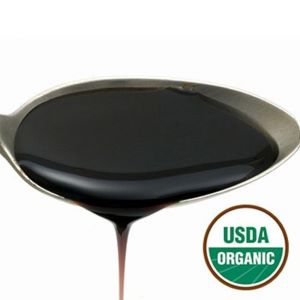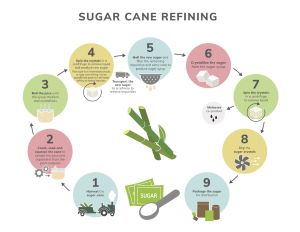Is Molasses Always Vegan?
By Jeanne Yacoubou, MS
In April 2022, The Vegetarian Resource Group received an email inquiry asking about molasses processing and the use of cow bone char. She was confused because of conflicting information she had seen on the Internet.
On the one hand, our 2007 article stated that molasses is never filtered through bone char. The email provided a link that stated molasses may have been removed from the sugar stream during refining before and/or after the sugar had passed through a cow bone char filter to become whitened.
The VRG reached out to the blogger who had posted the article. We wanted to confirm the source of his information. We have not yet received a reply.
Response from ASR Group
Next, we turned to the ASR Group, a major manufacturer of cane sugar. We reached out specifically to the contact we spoke with at length in 2001 for an article on bone char in sugar refining. We have not yet received a reply.
So, The VRG called and sent emails or website contact form requests to other numbers, email addresses, or forms appearing on the websites of Domino Sugar, C&H Sugar, and Florida Crystals. All of these sugar brands are owned by the ASR Group.
In October 2022, we received an email reply from Kate Murrell, Sr. Inside Sales Analyst with ASR. Here is that exchange:
The VRG: Is conventional (i.e., non-organic) molasses removed from the sugar refining process before AND after the decolorization step?
Murrell: Are you asking how our brown sugar is made? We have different production processes at each refining location.
The VRG: My question is about molasses, not brown sugar.
During the sugar refining process, is molasses removed before the sugar is decolorized? Or after? Possibly both, depending on the refining process?
I’m trying to determine if the sugar from which molasses is separated had been in contact with cow bone char (when that filtration method is used).
I understand that molasses itself is not decolorized. I’m referring to the *raw* sugar (cane juice?) from which molasses is eventually separated. In that case, the juice had not been decolorized, according to my understanding. But, if molasses is removed at the end of the entire process, then the sugar would have passed through a decolorization step (possibly using bone char).
Murrell: Your question would be which of our sugars are vegan. All our sugar is vegetarian.
Some refineries use bone char, others don’t. You determine if sugar is vegan by our lot code. If the lot starts with 1, 4 or 6 it is vegan with the exception of brown sugar starting with 6.
Note: To this email, Murrell attached a January 2021 letter from Michael Burnett with the subject heading: “Vegan Statement – Baltimore, South Bay and Yonkers.” The letter stated:
“Our Baltimore, South Bay, and Yonkers refineries do not utilize bone char for decolorization. These refineries also do not use any other animal ingredients or animal by-products in the manufacturing process, and the products manufactured at these facilities are not tested on animals. Given these conditions, all of the products manufactured by these refineries qualify as vegan with the exception of Light Brown and Dark Brown Sugars made in South Bay which are manufactured with a sugarcane molasses from our Arabi (Chalmette), LA facility.”
The VRG: Do those numbers apply to molasses? Would you see them on the bottle?
Murrell: We do not sell bottles of molasses in retail; you would have to check with the manufacturer to see if it is vegan.
Inferences about molasses’ vegan status based on ASR responses
There is a relevant point that emerged from that email exchange that provide clues to answering the question of whether non-organic molasses ever passes through a cow bone filter (in cases when bone char is the filtration method) and so would not be considered vegan.
Murrell’s attached letter from Burchell states: “Our Baltimore, South Bay, and Yonkers refineries do not utilize bone char for decolorization…all of the products manufactured by these refineries qualify as vegan with the exception of Light Brown and Dark Brown Sugars made in South Bay which are manufactured with a sugarcane molasses from our Arabi (Chalmette), LA facility.” [NOTE: Bolded by The VRG for emphasis]
From the bolded part of Burchell’s statement, The VRG infers that non-organic sugarcane molasses processed in a plant that uses cow bone char filtration passes through bone char. So, this molasses would not be vegan.
By contrast, certified organic molasses, like certified organic sugar, is never processed through cow bone char, so it is vegan.
Response from GloryBee on molasses processing
The VRG confirmed our inference on molasses processing during a 53-minute live chat discussion we had with Phoenix, customer service representative of a molasses retailer, GloryBee, in October 2022. Here are selected excerpts from that chat:
The VRG: Has the sugar that is processed to make molasses been filtered through cow bone char?
GloryBee: You will want to go with the organic molasses as these products are vegan.
The VRG: So the non-organic molasses COULD have been from sugar processed through cow bone char? You state on your site: “The cane is harvested and then crushed into a juice. The juice is then evaporated through a boiling process which promotes sugar crystallization. There are several different varieties of molasses depending on whether it is from the first boiling, second boiling, or third boiling. Blackstrap is from the third boiling which is when most of the sucrose from the original juice has been crystallized and removed.”
GloryBee: [This] comes straight from our QA department for the organic molasses: “Product: Organic Unsulphured Blackstrap Molasses (GB#11065)
Vegan Statement
The product listed above does not contain any ingredient of animal origin and can be classified as “vegan.” The equipment used in the manufacturing of the product listed above are used neither for the preparation of animal products nor for products containing ingredients of animal origin. Bone char is not used in the production process.
This is the only product for molasses which is the organic that I am seeing that has no animal product in it.
The VRG: Is that on the bottle?
GloryBee: It is not labeled as vegan on the bottle.
The VRG: Does the non-organic molasses have a vegan statement?
GloryBee: From our QA department: “Conventional molasses: The product listed above is acceptable for vegetarians but a claim for vegan status cannot be made. Bone char is used in the production of this product as a processing aid to remove color and other impurities from raw sugar.”
The VRG: Does the non-organic molasses bottle say it’s suitable for vegetarians?
Glory Bee: This is not listed on the bottle.
GloryBee: If you are ordering from our website then you would want to ask for any documentation you would need. Otherwise if you are buying this from a local store they should already have these documents on hand and be able to answer any questions you have.
The VRG: Do you produce your own molasses or resell from another company?
GloryBee: This is a repacked item for GloryBee.
The VRG: Repacked from whom? May I contact them?
GloryBee: Unfortunately, we are not allowed to give out our supplier’s information.
[END of chat]
The VRG asked Phoenix at GloryBee for more information on the boiling process that she had mentioned earlier in our discussion. For clarity, we sent a link from The Sugar Association website showing a diagram of the cane sugar refining process. Here is the diagram (retrieved February 2023):
It appears from the diagram that bone char filtration would occur in Step #5. The boiling processes occur before then in Step #3. So, it would seem logical to conclude that all non-organic, sugarcane molasses is removed from the sugar stream before bone char filtration. If so, all molasses should be declared vegan.
However, both Burchell’s vegan statement and the GloryBee chat transcript provide details that suggest non-organic sugarcane molasses is not vegan. The VRG next turned to the Sugar Association for confirmation.
Sugar Association response on molasses processing
During Fall 2022 when The VRG was investigating the issue of molasses processing, we called and emailed several employees at the Sugar Association about their diagram. At that time, the diagram was like the one shown above except in one way.
The earlier one (no longer on the website) showed molasses being removed during sugarcane processing both before and after Step #5 when bone char filtration occurs. Specifically, it showed molasses coming off after boiling (Step #3) and at Step #7, after bone char filtration.
If so, the post about non-organic sugarcane molasses sometimes being vegan – but sometimes not – would be accurate. It would depend on when the molasses was removed during the refining process.
In January 2023, we checked their website’s diagram. This time, it showed sugarcane molasses coming off the sugar refining stream only at Step #7, after bone char filtration. In other words, according to the Sugar Association, non-organic molasses derived from cane sugar is not vegan.
To confirm this conclusion, The VRG asked two other companies. In October 2022, Imperial Sugar told us they don’t use bone char. One online business that sells molasses, told us that since The VRG is not a paying customer, our question isn’t a priority, so they may not get back with an answer. As of yet, we have not heard.
VRG recommendations on vegan molasses
Based on this investigation, The VRG recommends that if you want to be absolutely certain that molasses is vegan:
- Purchase products that are certified USDA Organic. Cow bone char filtration is never a part of organic sugar processing as a decolorizing step. Thus, cane sugar crystals appear yellow or tan instead of white. Molasses from organic cane sugar is dark or light brown just like that from non-organic cane sugar.
- Non-Organic molasses derived solely from beet sugar is also vegan since sugar beet processing does not involve cow bone char or any other animal-derived processing aids.
- Non-organic molasses derived from cane sugar or a combination of cane sugar and beet sugar has gone through a cow bone filter if it were processed in a facility that uses cow bone char filtration. Not all do. Check with the manufacturer to be sure.
- Interested consumers should note, as GloryBee stated above, non-organic molasses may be considered vegetarian even when cow bone char is the filtration method.
The contents of this posting, our website and our other publications, including Vegetarian Journal and Vegan Journal, are not intended to provide personal medical advice. Medical advice should be obtained from a qualified health professional. We often depend on product and ingredient information from company statements. It is impossible to be 100% sure about a statement, info can change, people have different views, and mistakes can be made. Please use your best judgment about whether a product is suitable for you. To be sure, do further research or confirmation on your own.


